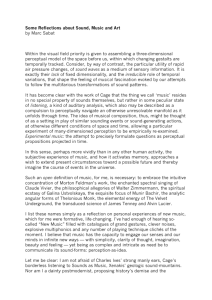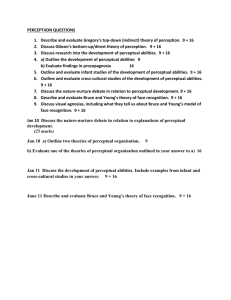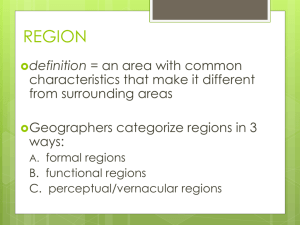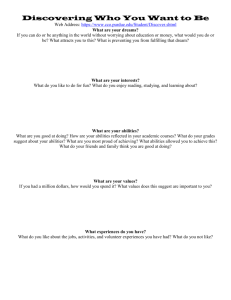Motor Control Theory 1
advertisement
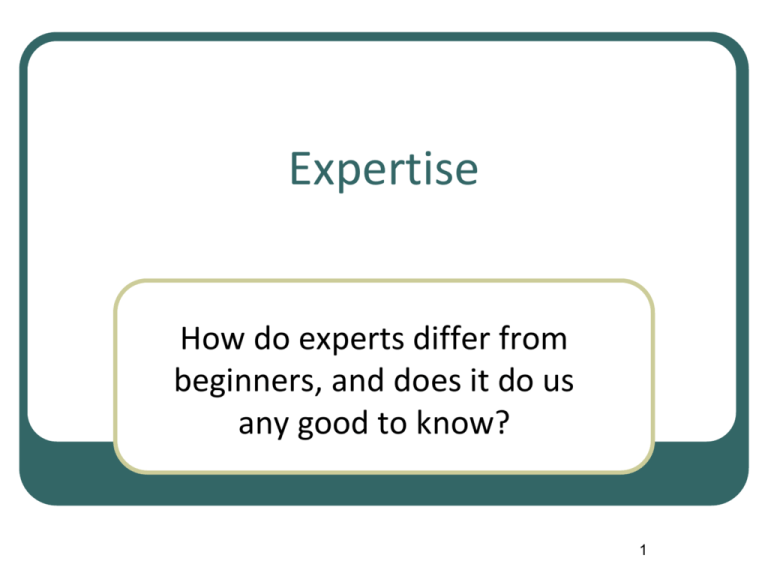
Expertise How do experts differ from beginners, and does it do us any good to know? 1 Questions: 1. What is an expert? What is a genius? 2. Have you ever met either one? If so, what characterized their capabilities and made them different to yours? [what are the differences between experts, geniuses, and “normals”?] 3. What do you think contributes to the development of expertise? And genius? 4. Is expertise in sport tasks different to that of musicianship, or management skills, or indeed any other life skill? 5. Can you become a genius? An expert? If so, in what field? 2 Stages of learning How much practice does it take to progress from one stage to another? Cognitive Associative Autonomous Ericsson et al. (1993) – 10 years • Open to debate (age, resources, etc.) • What do we know about reasons for people differing in their responsiveness to practice? 3 Understanding expertise 1. Individual differences • Differing traits among people – data is good, perhaps conclusions less so? 2. Information processing • Different use of environmental information among people – attunement, invariant features? 3. Expert-novice differences • Study experts & non-experts directly, and describe differences – do we see evidence supporting the above two items? 4 1. Individual difference approach Abilities & their origin • This is pretty important, if we are to critique the idea of abilities… • The notion of abilities is based mostly on research from the latter half of the 20th century (e.g. Fleishman & Quaintance, 1984) • The studies went something like this… 5 1. Individual difference approach What is the research supposed to examine? • EG: This graph shows fictional data for the amount of variation in performance of 4 skills that is explained by each of 3 abilities other muscular endurance eye-hand coordination multi-limb coordination Performance Variation 100% 90% 80% 70% 60% 50% 40% 30% 20% 10% 0% Cycling Catching Chess Throwing 6 1. Individual difference approach Take Fleishman (1957) as an example: Take a large number of people (200) Have them perform a large number of motor tasks (18) • Group the tasks into factors, according to how performance varies on each task • The idea is to identify as few factors as possible to account for as much variation in performance on the tasks as possible • We can get an idea of this by looking at the factor table… 7 Factor Matrix (from Fleishman, 1957) – partially reproduced for instructional purposes Factors Variable I II III IV 1. Instrument comprehension .18 .22 .13 2. Reaction time .60 -.15 -.03 3. Rate of movement .43 .19 -.06 4. Pattern comprehension .12 .66 .07 5. Mechanical principles .03 .53 .52 6. General principles .05 .19 .65 7. Speed of identification .27 .44 .17 8. Visual pursuit .14 9. Complex coordination trials 1-5 .05 10. Complex coordination trials 12-16 .23 11. Complex coordination trials 49-53 .42 12. Complex coordination trials 60-64 .43 13. Rotary pursuit .28 14. Plane control .16 15. Kinesthetic coordination -.01 16. Unidimensional matching .14 17. Two-handed matching .16 18. Discrimination reaction time .28 .24 .20 V VI VII VIII IX The idea is to name the factors according to what types of task “load” on them E.G. These are .23 .05 the only tasks to .35 .26 load on factor IV. .16 .21 The factor was called .13 .22 “Mechanical .12 .20 Experience” .15 .15 If .07several tasks .28 like ball bouncing and juggling and catching all -.16 .28 loaded together, we might use a .16 .14 label like “eye-hand .21 .15 coordination to name the factor 8 1. Individual difference approach These factors all explained some variation in performance of a number of motor tasks The actual list compiled will depend on the tasks used to compile it The question is, is it worth anything? • Does the existence of correlations indeed suggest hardwired abilities? • Can you think of any issues with this? • Are experts born or made? Any relation to genius? Worth noting that no general ability diffs are found between experts & non-experts 9 1. Individual difference approach NB – Steve Keele & colleagues: timing control, force control, and a general timing ability. A continuum from traits to learned differences? • Existence of differences in things like visual acuity and depth perception have not been found to indicate reliable differences between experts and novices 10 2. Information processing approach 3 stages of processing perceptual decision response Stimulus identification Response Selection Response execution Clarity, intensity, familiarity of stimulus # of alternatives, compatibility of stimulus and response Complexity & duration of movement, accuracy demands 11 2. Information processing approach 3 stages of processing • The idea is that experts are quicker at all three than non-experts • Here the differences are easy to identify • Doesn’t distinguish whether these differences are necessary conditions for expertise to emerge, or are merely byproducts of expertise • Also, doesn’t mean you should teach them, or does it? • See “sport vision training” • Should be domain and task specific (attunement) 12 2. Information processing approach 3 stages of processing • 1. Perceptual differences • In visual search (what do they attend to) • – seeing whole arm vs. racket of racket players (Abernethy, 2007) • Shifting gaze from trunk to racket between preparatory and execution phases • In awareness of the game structure (in chess, but then basketball, rugby, hockey, etc (Allard, Abernethy et al.) • Basically pick out the cues that matter (e.g. Williams, 2004) • Cognitive/perceptual machinery changes with experience – Gibson’s attunement to perceptual invariants 13 2. Information processing approach 3 stages of processing • 2. Decision differences • General response first (stride) then specific later (swing) ( ~ in cricket) • Allows more processing prior to decision, avoids being rushed • Response selection delayed by increased # decisions, so reduce decisions - anticipation 14 2. Information processing approach 3 stages of processing for information • 3. Response differences • Automation • You aren’t aware of most of the movements you are “expert” at • What are we to make of this? • See implicit learning, and memory location and coding 15 3. Expert-novice differences approach What’s the focus here? • Simply, are there reliable differences between experts and novices • Specifically, can we get any hints about coaching or athlete support from the literature concerning expertnovice differences? 16 The 10-year rule It’s well known, but... • More interesting is how it can be altered through other variables • Frustratingly little on this in the literature 17 18 “Hardware” & “Software” Hardware (more resistant to change once established) • Relatively simple tasks • Don’t alter much with practice • Performance seems to be determined by unchanging basic properties of the nervous system • See previous comment on visual acuity, depth perception and so on • E.g. Helsen & Starkes (1999) – found no explained variance in soccer experts due to “hardware” (simple RT, peripheral RT) (did find a lot in software components – next...) 19 “Hardware” & “Software” Software (less resistant to change) • More complex movements and or visual stimuli to either perform, recognize or recall (see IP section – differences are everywhere) • Greatly dependent on practice • It is these that experts tend to develop • E.g. recall/recognition of game information (Chase & Simon) • Squash example (Franks, Khan, et al. 2002) • As a result of this, it’s in these that research finds the expert-novice differences 20 Game structure Experts recognize it far better • Original research was in chess • Generalizes pretty well to sport • You are probably aware of it in driving (novice drivers don’t notice things like school signs and different road markings as well) 21 Watching versus playing Expert watchers don’t learn the same stuff as expert players (think about it – the experience is bound to lack the same rich detail) 22 Visual cues Experts direct visual attention differently • Abernethy argues that teaching this is not effective (knowing where to look is no good without knowing what to do) • But it hasn’t been examined fully • Some research by Williams (2004) is starting to find some encouraging results (practice both looking and doing) • See also this week’s readings 23 Family Makes a difference • Examples differ in respect of the ideal, but clearly good support encourages expertise • Perhaps the ideal differs depending on a number of factors 24 General “Vision Training” Programs http://www.bausch.co.uk/en_UK/consumer/age/s portvision.aspx As a group they seem to suggest those “hardware” skills can be trained, and that they will result in improvements in specific sports • But the hardware skills did not distinguish between experts and novices • And they did not account for variance in expert novice performances • Basically, any improvements are unlikely to transfer to specific sports 25 Specific Perceptual Training Specificity increases likelihood of success • Training at the more complex visual stimuli encountered in the real sports scenarios • Abernethy (1997) still skeptical – must train the “doing” as well as the perceiving • The area suffers from internal validity threats 26 “Early Developers” & Expertise Most evidence suggests that nurture, not nature, causes expertise Relative age • Being born early in the school year increases access to further coaching opportunities • Such early influences can play a large role in who is excluded from the “next tier” 27 Deliberate practice and expertise ...more is better • Beyond that, the research doesn’t really add much • The experiments needed for accurate assessment can’t be conducted One question is what leads some people to practice this much while others don’t? • Again, the answer is probably multi-dimensional 28 The what and how of practice How can knowledge about how to perform best be conveyed to learners • This is a question that is somewhat separate from expertise per se • It’s about type of practice rather than how much • And it links nicely with the next section - feedback 29

